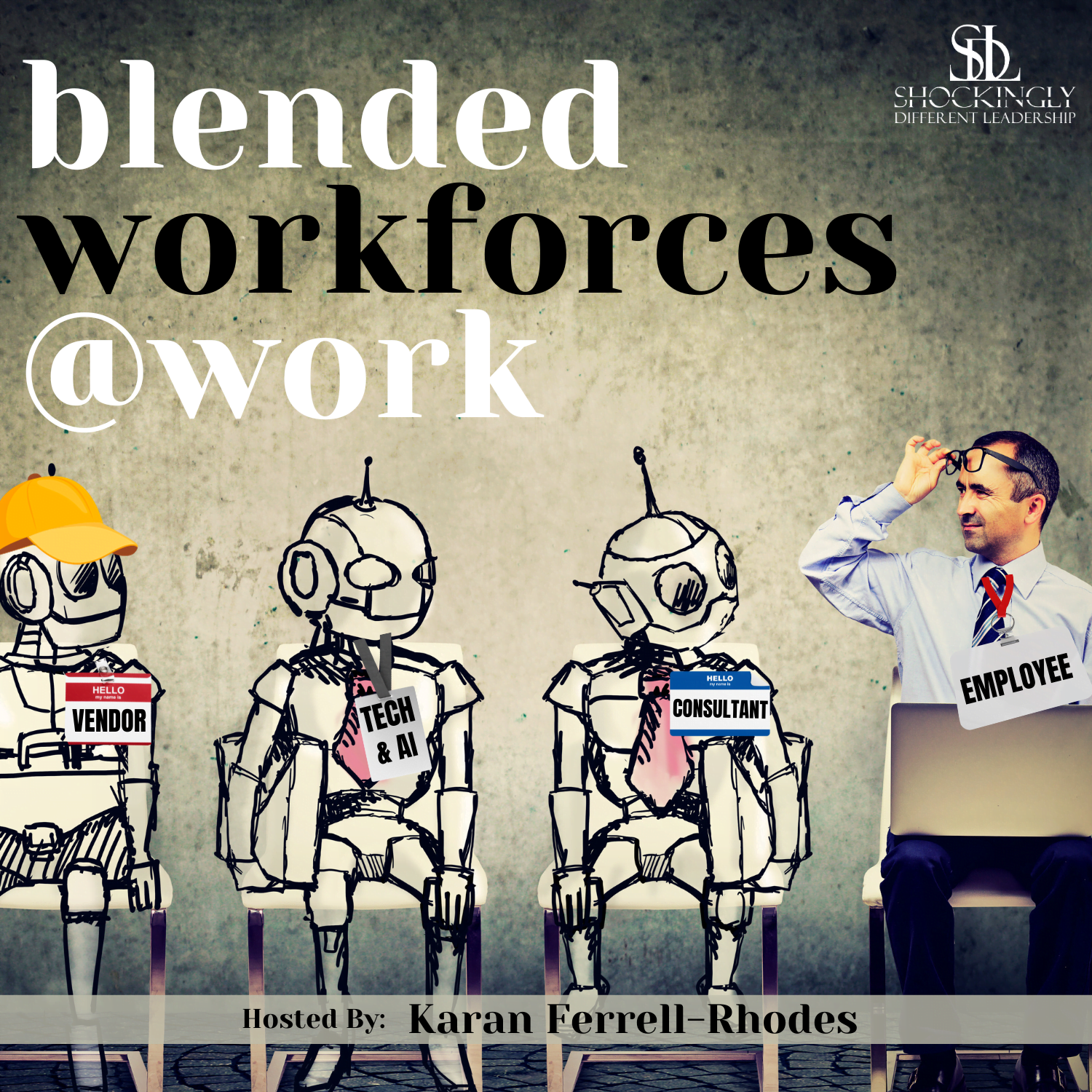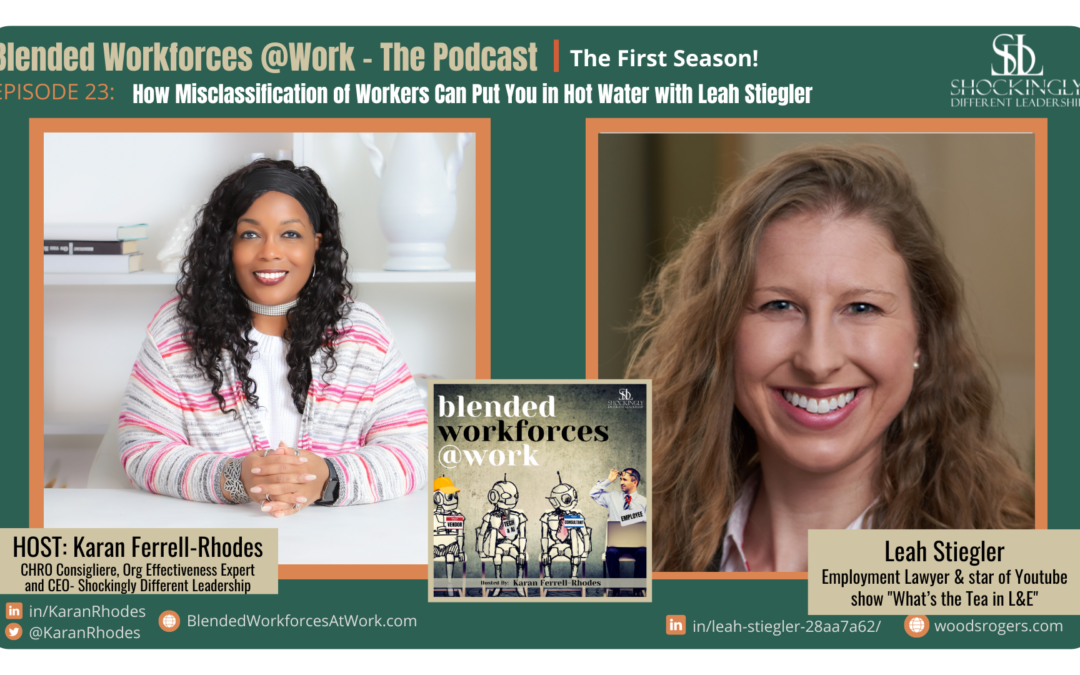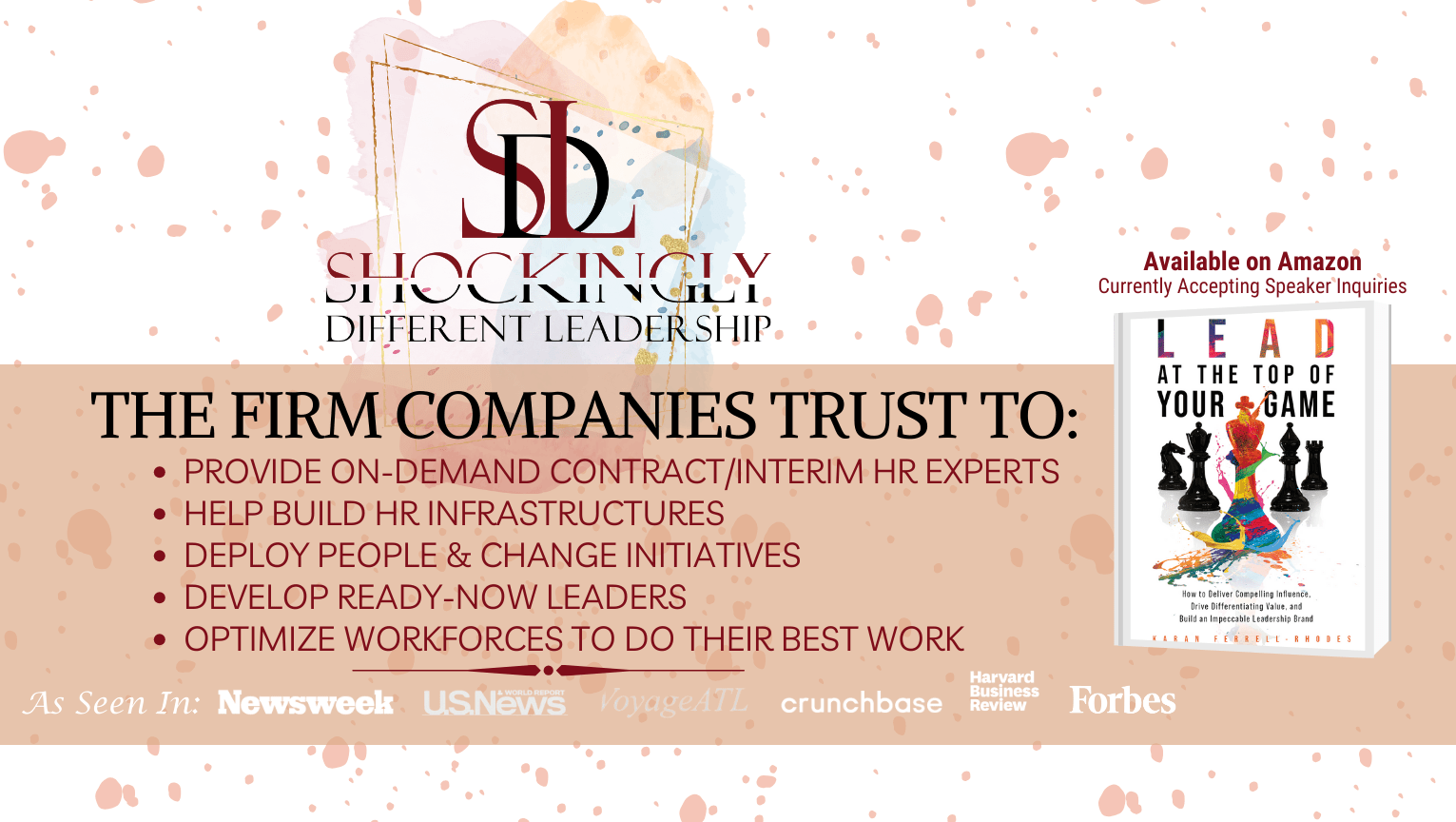IN THIS EPISODE, KARAN FERRELL-RHODES INTERVIEWS LEAH STIEGLER
Join us for a dynamic discussion on the complexities of managing blended workforces, including contractor misclassification, joint employer liability, and more!
Leah Stiegler is a management-side employment lawyer at Woods Rogers. Leah adeptly guides employers through complex workplace issues, covering everything from recruitment to severance, ensuring compliance, and preventing legal disputes. Also, She combines legal expertise with a touch of humor in the YouTube series What’s the Tea in L&E.

Posted by
SDL Media Team
Rather view our video podcast?

WHAT TO LISTEN FOR:
- What is contractor misclassification, and why is it significant?
- What are the legal implications of misclassifying workers?
- What challenges do smaller firms face in maintaining legal compliance?
- What is joint employer liability?
- Why is it essential for managers to be trained in handling complaints and compliance?
- What should third-party contractors have to avoid legal issues?
- How can strategic decision-making balance profit and people-driven approaches?
“Companies really need to question themselves, [to ask] if they are truly legally compliant.”
FEATURED TIMESTAMPS:
[03:08] Leah’s Life Outside of Work
[05:23] Leah’s Professional Background and Woods Rogers Overview
[09:03] Current Trends and Challenges in Employment Law
[19:55] Signature Segment: Leah’s entry into the LATTOYG Playbook: Joint Employer Liability and Compliance
[30:13] Signature Segment: Leah’s LATTOYG Tactic of Choice: Leading with Strategic Decision Making
[31:59] Learn More About Leah’s work!

ABOUT LEAH STIEGLER:
Leah Stiegler is a management-side employment lawyer at the Virginia-based law firm Woods Rogers. She stars in her own YouTube series, What’s the Tea in L&E, where she and a colleague tackle – with good humor and straightforward advice – topics that today’s effective leaders must navigate.
Leah can walk employers through any workplace situation. From complex personnel matters to implementing client-specific performance management practices, she advises employers to navigate these issues to keep them out of court. Her counseling covers the entire employment spectrum: recruitment, onboarding, workplace culture, pay equity audits, RIFs, terminations, and severance packages.
LINKS FOR LEAH:
- LinkedIn: linkedin.com/in/leah-stiegler
- Youtube: youtube.com/@woods-rogers/
- Leah’s YouTube Show: What’s the Tea in L&E: https://youtube.com/playlist?list=PLftX0XGFIu-UEl60JJFXr0dQbzsh1vuOD&si=6f-nWlUJxAXDckBe
ADDITIONAL RESOURCES FOR YOU:


Episode Sponsor
SDL is the go-to firm companies trust when needing to:
- supplement their in-house HR teams with contract or interim HR experts
- implement leadership development programs that demonstrate an immediate ROI and impact on the business

Episode 23 | How Misclassification of Workers Can Put You in Hot Water with Leah Stiegler
Leah Stiegler 00:00
A third party company, a big issue now is contractor misclassification. So in March of this past year, Department of Labor passed a new rule that said, hey, in order for us to decide whether or not someone is a contractor, here the six, here’s a six factor test that we’re now going to consider. And it used to be more based on whether or not a particular company had control over a workers, you know, duties and tasks and scheduled, and now that’s just one of six factors.
Karan Rhodes 00:03
Blended workforces are one of the hottest talent strategies today, where employers are using a mix of traditional employees with external resources like independent contractors, coaches, consultants, vendors, and technology solutions, all in order to enhance competitiveness, ensure cost flexibility, and expedite business goals. But how are the successful companies infusing blended workforces into their business strategy? And what are the critical success factors and pitfalls to avoid during implementation? And on the flip side, what does it really take for suppliers to improve their chances of finding and landing contract opportunities? The devil is in the details, my friends! I’m your host, Karan Ferrell Rhodes, and it’s time to get smarter about Blended Workforces at Work! Hello, my superstars out there. This is Karan, and welcome to another episode of the blended workforces at work podcast. Now on today’s episode, we are so honored and pleased to have Leah Stiegler, who is a principal at the Virginia based law firm, Woods Rogers, where she is a management side employment lawyer, and we’re going to dig deep into what all that means in just a second. But what is also really cool about Leah is that she stars in her own YouTube series. What’s the T in L&E? And L&E stands for labor and employment. So all these labor and employment, she gives tips insider information, and I had a chance to see a couple episodes. She had some guests with her, and they had such rich conversations. So you definitely need to take check out her YouTube series. But I thought it’d be really tremendous to have her on the show to chat about some of the hot topics that employers are facing right now and how they’re navigating through blended workforces. And because she’s an HR lawyer, if you will, she had some insights on both the employer side as well as the third party side and technology. So she’s not the perfect person for our show as a guest, I don’t know who is so welcome to the show. Leah,
Leah Stiegler 02:10
Thank you so much, and that was a very nice introduction. I appreciate it.
Karan Rhodes 02:14
You’re so welcome. You’re so welcome. Well, as you know. BRP, chat, I have a million questions that I want to cram into these 30 minutes, and I know we can’t do it all, but do our best. But before we get started, we always love to know just a little bit about our guests. So for just as even much as you feel comfortable, would you mind giving us just a sneak peek into your life outside of work?
Leah Stiegler 02:37
Yea, sure. Well, I’m a devoted dog mom. My dog is named Van. I named him after Van Gogh because I got him from the shelter and he’s missing half of an ear. So I thought that was clever, because Van Gogh cut his ear off
Karan Rhodes 02:50
Yeah.
Leah Stiegler 02:50
And it works for Evander Holyfield, who Mike Tyson, bit his ear off. So it’s van kind of works, right? And I’m also a devoted basketball player who refuses to retire in her 30s. So I frequently put myself through the trauma of trying to run up and down a court and jump all around and then feel the aches and pains the next morning when I wake up. But it’s it’s something fun I love to do. So,
Karan Rhodes 03:15
Oh, wonderful, wonderful. Well, thank you so much for sharing that. And if you don’t mind, what’s like the general area of the country that you live in?
Leah Stiegler 03:23
Virginia. So I live in Richmond, Virginia, the capital. Grew up in Northern Virginia, right outside DC, went to Virginia Tech go Hokies, University of Richmond for law school. Lived in Norfolk, Virginia, and I clerked for a federal judge out there. Also lived on the western part of the state with my firm. So I’ve kind of been all over
Karan Rhodes 03:41
Gotcha. Well, you know, I know a lot of firms. I know the your law firm is Virginia based, but sometimes they have lawyers in other states as well. So I wasn’t sure if you’re based in Virginia or somewhere else, but I think you’re a Virginia girl through and through.
Leah Stiegler 03:55
Oh yeah. Well, we have attorneys. We’ve got 140 attorneys, and they’re barred through, throughout all over the country. We work all over the country, just because, I think, you know, as you know, with blended workforces in general, you’re oftentimes companies are fewer, less and less. Are they just located in one distinct area, but they may have employees or contractors all over the country, so we’re frequently on the road.
Karan Rhodes 04:19
Yeah, I can imagine. Well, thank you for giving us that sneak peek, and if you don’t mind, let’s go ahead and dive into some of the work you’re doing and some of the trends you’re seeing, but let’s start off by because I know I didn’t do it any justice. Let me first have you start off by sharing a bit more broadly what Woods Rogers does as a law firm, because I know you have a lot of specialties, and then if you can also zone in on yours, in particular on management side employment law,
Leah Stiegler 04:51
Absolutely so we are medium to big size law firm. We have practice or we have attorneys in all different practice areas. Can. Have to specialize nowadays. There’s not really, you know, because things are so nuanced and regulations are so detailed. So we have attorneys that do everything from healthcare, regulations, cybersecurity, tax, then we have a very big employment law side of our firm, and that’s where I practice. And so we do management side employment law. I like to think we are HR lawyers. As you mentioned, I’m usually on the phone most of the day with different HR professionals or CEOs and talking through different employment situations, so helping employers navigate through whether it’s harassment and discrimination in the workplace, wage and hour issues, contractor concerns, workplace violence, anything that’s pretty much happening in life is probably happening in the workplace. So it’s kind of fun, because we deal with life at work. But I love it. No, and you’re probably, I would say I appreciate more what you do, because you’re kind of on the front lines with the employers. You know, I’m like the coach on the sidelines in a way, or maybe even the announcer in the box being like, call this play. And you guys are on the front lines, like handling the terminations, dealing with, you know, maybe a workplace complaint that came up. So yeah, but it’s great. I I love it. You get to work with different industries. We don’t specialize in any particular industry. So you know, in the morning, I could be working with a higher ed institution, then move on talking to a healthcare institution or retail outfit, and just you see all sorts of different situations in different workplaces, and no two situations are the same,
Karan Rhodes 05:47
And you know me being, you know, 20 years on the HR executive side, so like people like you are mine on speed down, and then now, being on the consulting side I get to see on the other side and go in and help spot, not on the I wouldn’t say I give them legal expertise, but we consult on the strategic side of how to implement some of your recommendations. So I can appreciate exactly what you did. I bet there’s never a boring day, right? Never, never the same. And there’s usually some interesting or sometimes even crazy dynamic that’s going on that on the surface when they like call you and say, I needed to talk to you about a challenging termination. But then when you actually talk and pull back the layers of the onion, you’ll find all kinds of interesting, complex obstacles to navigate. It’s never as easy as it seems when push through the request
Leah Stiegler 07:38
Absolutely and you know, it may not even be I need to talk to you. It’s more like you will never guess what this reason did at work today. Oooh, tell me!
Karan Rhodes 07:52
Yeah. Well, gosh, there’s so many areas I want us to start off in, but I guess let me let’s start off by if you can share maybe one or two trends that are top of mind right now that you’re seeing in the workplace arena, some of the things that some employers are having to tackle right now, it may or may not have to do with, well, it always has to do with blended workforces, but it may or may not have to do with the traditional employee side, or the supplier or tech side. But could you share maybe one or two things that are kind of hot right now that employers are facing and trying to address?
Leah Stiegler 08:32
Absolutely, I think what I’m seeing is a lot of federal agencies, whether it’s Department of Labor, whether it’s the Federal Trade Commission or different state agencies, they’re trying to close loopholes that oftentimes companies may or may not have used over the years or different arguments that would normally be made in court. So in working with, let’s say, a vendor or a third party company, a big issue now is contractor misclassification. So in March of this past year, Department of Labor passed a new rule that said, hey, in order for us to decide whether or not someone is a contractor, here the six, here’s a six factor test that we’re now going to consider. And it used to be more based on whether or not a particular company had control over a workers, you know, duties and tasks and scheduled, and now that’s just one of six factors. So the contractor misclassification issue is really a big deal, and you see a lot of lawsuits coming out of that, and they can be or different legal implications that come out of that, whether you have someone misclassified as a contractor and you face the Department of Labor investigation or action, whether it’s a different states have different laws as well. So you’re you know, you might have employees working in different states, and if you have them classified as contractors in various states, it might be that those states have their own independent contractor rule too. So employers companies really have to be aware of. What they’re getting into when they’re hiring or engaging with contractors all over
Karan Rhodes 10:03
Right? Absolutely, that’s when we’re seeing a lot as well. And people really don’t think of that. I would say companies don’t. Some companies, you’re more enterprise level firms, the larger and enterprise level firms, they know those implications. But what I’m seeing is the smaller size firms and the mom and pop firms kind of overlook it, and I try to share with them, you know, the risk that they’re facing by via those misclassifications, and what do they really mean? So your everybody needs to look up that legislation to really understand those six criteria.
Leah Stiegler 10:41
Well, and to your point about the smaller sort of mom and pop shops. I mean, for businesses, I would love for every company to be perfect legal compliance, but sometimes that conflicts with actually making a profit and getting up off the ground. And so most startups actually do just engage contractors. And so they have individuals as 10, you know, classified as 1090, nines. But they need to do that because maybe they don’t have the stable funding to hire someone full time as an employee. And so sometimes you may have to take those risks to get started. The big the problem, though, is when they don’t adjust right moving forward. And so I talked with a potential client the other day, and they said, you know, well, we don’t really have too many employees, so it’s really not, not that big of a deal. And I said, Well, how many employees do you have? Oh, well, we have about 12 employees. I said, okay, yeah, it’s a small outfit. And I said, Well, how many contractors do you have? 400
Karan Rhodes 11:35
Oh, wow,
Leah Stiegler 11:37
I think we’re on an issue here. A lot of these contractors have been there for a long time, and you’re starting to see a lot of class actions by individuals who are misclassified as contractors bringing claims against those companies. GEICO was actually recently hit by individuals that they had classified as captive insurance agents who were retained to sell only GEICO Insurance. So kind of hard to say that they’re not employees. Like, if you were only allowed to work for one company, it would be hard to say, Yeah, I’m a contractor who can go make a profit, you know, offering my services to other competitors and other industries. And so they had a group of contractors file a lawsuit against Geico, basically saying they were misclassified and they were entitled to or they argued they were entitled. They should have been awarded health benefits offers into the 401 k plan that GEICO offered their employees. And so you’ve got to be concerned about these private lawsuits that could be brought, as well as using state individuals are using state law. So in Virginia, there’s state law that says, and a worker is presumed to be an employee, and it’s up to the employer to really push back and have evidence showing that, no, they’re not an employee, they’re a contractor. And so you want to make sure companies want to make sure they they are engaging right in the right way up front, or at least making sure they’re getting into compliance, whether it’s with these new federal rules or deter you know, decisions made by the the unemployment commission in their state, or even workers comp carriers will say, yeah, no, if that person was an employee, we’re not going to handle it. And then I’ve had workers try to sue the actual company for back wages on, you know, for lost injuries that, oh, because there was no insurance provided. So…
Karan Rhodes 13:30
And I know you’re more than aware, but you know, the hat bed has been California with the, oh, you know, the Ubers and lists of the world and door dashes, you know, those delivery and ride share type of firms. But I think it’s important for listeners to know that it’s not only contractors in those sense, for your more more, I say blue collar type of workers, but it’s the same with your more white collar and more professional services type of workers as well they’re facing, you know, similar challenges, which is exactly your your GEICO example was a perfect example of that. So, yeah, absolutely careful about that.
Leah Stiegler 14:10
Well, in in California, cities like California and Massachusetts there, I will give them credit, because what they’re trying to do, I think the US system is, is very siloed. It’s like you’re either an employee or you’re a contractor, and it’s really hard because neither of those models always fit with what a company is doing. And so I think we’re going to start to see a trend towards more what California and Massachusetts are doing, which they’re creating these laws that basically say, okay, you can classify someone as a contractor, but you’re going to pay this, at least this minimum type of wage to them, and you’re going to offer them a stipend towards health benefits. So it’s kind of finding a middle ground. Now, the real concern would or question will be, is the federal government ever going to follow suit? And you’d love to see it with like the IRS, right? Because,
Karan Rhodes 15:00
Yeah,
Leah Stiegler 15:01
Yeah. Like people will, you know, mis…companies will miss comp misclassify workers as contractors, yeah, issue them a 1099, and the person doesn’t pay their, you know, their taxes throughout the year, and then comes back and says, Oh, I thought my taxes were being taken out. Well, no, no, you were a contractor, and those taxes are on you, right? And then they complain to the IRS, the IRS goes and looks at the company and and in Europe, my colleague was telling me that Europe, in a lot of countries, they don’t have just like a two two categories. They have sort of a middle ground. You’re a quasi contractor employee with a totally different tax bracket. And I think it’d be great for the US to implement something like that.
Karan Rhodes 15:40
I think the laws, in my opinion, around blended workforces are going to need to be more defined, because it’s becoming, you know, more and more of a norm than has been previously. And to your point, it just needs to be clearly defined. And I do think at some point we’re going to need that middle ground space, because there are, you know, a lot of workers that would fall into that middle ground, similar to Europe. They have it in some areas in Asia as well. And you know, when I consult, because I do a lot of consulting with firms when they’re trying to implement blended workforces, we would really start with the task. I mean, there’s, there’s no reason you can’t use contractors, but you have to be very clear about which task can be done independently, without work direction and without, you know, stipulations around it, as long as it gets done by a certain date that you negotiate in the contract, versus things that really fall under the employee umbrella, which will, you, know, increase your legal risk, but you live and breathe that every day on the legal side.
Leah Stiegler 16:55
I’m always curious what what other people advise in this area, because, to your point about it really comes down to the tasks and the duties that the individual is doing, or that the maybe a third party company is doing. And I’ve seen situations where I’ll say, Well, what do you have this contractor doing? And the client will send me a job description, and I’m like, oh, no, no, no. A job description is more for an employee, right? Like, I want to see something like a scope of work, and I’m curious what you’ve seen in terms of how companies are engaging with third party contractors and how they’re defining what what duties that person is supposed to do.
Karan Rhodes 17:30
So this is that is a huge risk, and I coach and counsel against that. They do the thing they start out with job descriptions, but what I you know, my team usually does is we will go in and we’ll work with them and dissect the job descriptions and take out the actual tasks that they are wanting the contractors to do, and then create, I’ll say a request for statement of work. I’m like, what would those parameters be? And use a totally different document when recruiting contractors and then also putting in guidelines on how to interact with them, what you can and cannot do. We have to prep the workforce and the people managers around them. Because that was one thing I always joke about. I said, you know, this is one class they didn’t have in business school. They didn’t teach you, you know, how to, you know, interact with external entities. People are like flying by the seat of their pants, unless they get coached by the HR legal or somebody else. And a lot of people are not knowingly knowing they’re breaking the laws, if you will, and put companies at risk. So we have a very holistic approach to look at their entire workforce and try to first define if they really want to go down this route number two, to put, you know, things in place to make sure that it’s going to be a productive and legally compliant workforce. And what a lot of employers realize when we work with them is that they’re able to pull out some of the more mundane tasks that a contractor could do, and that helps to optimize internal workforce or more strategic tasks that help the company. So there’s a lot of work, tons of work, that goes into it, but I will admit there are quite a few people that are stepping over that line that they really don’t want to cross.
19:24
Right. Right. And it’s easy for us, I think, to sit back and say, here’s the right way to do it, technically, right? And I always use that term with clients, technically, this should go this way. But as in general, I mean, as a management side employment lawyer, and as you know, from your perspective too, it’s like we’re generally counseling individuals. And so sometimes we have to take into account that, you know, there’s the profit, the results driven approach, there’s the people driven approach, and then you got to somehow find a business aspect that that works. And I love how you were saying. You even have to kind of work from a look at the work your workforce, like the actual company’s workforce, and how they’re going to blend with these third parties. And I always tell clients, you know, if you are engaged, if you, let’s say you’ve got temp workers on site, or you’ve got a vendor with a group of employees on site that are working on on a particular contract, you need to train your managers that on how to respond to complaints issues. You know, if one of them comes to you and says, Hey, someone’s threatening with me with violence, or I’m being sexually harassed by some by this person, yeah, like, you’re gonna probably be deemed a joint employer, and so the managers are gonna, they can’t just say, oh, we’ll go, go complain to your own company, right? No, you need the actual company where they’re located, or the individuals they’re working with. They’re potentially liable as well. And so we need to make sure that that is appropriately communicated down the chain of command.
Karan Rhodes 20:54
That’s absolutely correct. You’re absolutely right. And I you know, when we think about it holistically, actually your third party workforces need to have their own rhythms and policies and processes themselves internally within the company, so everybody knows how to, you know, treat them appropriately and and you know, also, there’s some companies that their employees are willing to Move over to be contractors. And so there’s a whole process to introduce the concept to, you know, build those statement of works that are available for contract type of roles, and then transitioning employees from the employer side to the contractor side. And then who’s managing that, you know, is in another third party that’s managing that, or you have vendor relations that is managing that. How does that work? So it can get very complex, as you know
Leah Stiegler 21:48
Absolutely well, that’s sort of where, you know, I will say that we’re going back to what the courts are kind of trying to and these agencies are trying to close these loopholes. Yeah, there have been some cases that have come out where there was a saw one recently in Bloomberg News, where a trucking company was hit with an issue where a bunch of drivers that they had classified as contractors sued the trucking company, saying, Hey, you didn’t pay us minimum wage in overtime. You were just paying us these flat fees for these, you know, for travel trips, and a company tried to come back say, no, no, you guys, are you drivers? Are independent contractors. And the court said, you don’t really care if they’re independent contractors. They said, You know, I mean, sure you if you got a company here, I’m a visual person, right? So a company, ABC, fictional company, at the top, draw a line down directly underneath, and those are that company’s employees, and then draw maybe a diagonal line from that ABC company over to, you know, the con, the group of contract workers, right? And maybe even a contract company. Well, the courts are saying, fine, if you don’t want them to be employees, but you know what, then we’re going to find that you’re a joint employer with this company. And so that’s the other big area of law here. Is like, well, now you’re a joint employer with this contract company, and so we’re still going to hold you liable for as a joint employer you didn’t pay them appropriate minimum wage and overtime. And so it is harder, I think, going into it, companies really need to work with experts and consultants in this area like yourself and legal counsel and make sure they understand upfront. Okay, are we classifying these people appropriately? That’s probably number one, right.
Karan Rhodes 23:27
Number one. Yep.
Leah Stiegler 23:29
Number two, do we have, what kind of provisions do we have in our contract with that other company, right? So do we have an indemnification clause, and how are we going to handle things that arise? So I had an EEOC case for a healthcare institution where they had traveling nurses on site, and a traveling nurse was requesting an accommodation to the supervisor and saying, hey, you know, I need a flexible schedule. I’ve got these doctors appointments and treatment in the morning. I need a flexible schedule. And the supervisor was like, well, that doesn’t work here. And they ended up terminating the person well that the EEOC said they, they the EEOC found that the healthcare institution where the contractor was working was liable for failing to accommodate under the Americans with Disabilities Act. And the company tried to say, Well, no, no, that. What about this other employer over here, the actual traveling nurse Agency, and the EEOC said, I don’t care. That’s between you and them, right? And so you want to make sure you have a good overview with these third party companies in terms of, okay, if requests for accommodation come up, how are we going to handle those? What’s the communication back and forth between leadership at both companies and who’s going to pay for these things? Yeah. Or if there’s a harassment complaint, are you going to let us know so that we can make sure we remedy harassment on our work site? Yeah? And just making sure you have those you delineate not only sort of monetary aspects, but indemnification. If there is some sort of lawsuit against one party or another, um. As well as just an overview of how do you handle complaints by these, these temp workers, or if they engage in misconduct?
Karan Rhodes 25:07
That’s right, that’s right. I have one for you, and I wrote about it in a blog about a independent contractor. She wasn’t. She was that with an agency who wasn’t self employed, her own little small business who was expecting a child, and the company that hired her, because she was a contractor, didn’t allow she had been a long time contractor, like years worth, and remember what state it was in, but she needed time off, a couple months off to have the baby, and they immediately terminated her contract when they found out she was expecting, she actually sued for the balance of her work that was owed to her, and she actually won.
Leah Stiegler 26:00
Oh, yeah.
Karan Rhodes 26:01
Yeah, so just because they’re a contractor doesn’t mean you can just slight them as well, especially if it was it’s longer term, which I did. I forgot the exact law. I have to go back and relook it up. But I mentioned it to say that every situation must be investigated within itself for federal, state and local guidelines and make sure that you know you are treating your third parties correctly, just as you would your employee population.
Leah Stiegler 26:29
Absolutely, yeah, and I would hope that company wouldn’t also take that same approach with an employee. Oh, my. I always tell clients, I’m look, I’m like, Look, I haven’t gone through it, but I’m pretty sure pregnancy is temporary, so don’t worry, she’ll be back at it soon. And if she’s a good worker, work with it, right? But, but you’re exactly right. I mean, especially when companies really need to at least question themselves. If somebody is on staff, see, that’s a that’s that’s a bad term to use if you’re gonna say they’re a contractor. If somebody is retained as a contractor for longer than six months, that is an easy test to say, Okay, let me talk with HR. Let me let’s figure out whether that we need to actually move this person over to be a w2 employee, because at that point, a lot of courts would are kind of looking at a six month test and saying, you know, maybe you kind of got to look and consider whether or not this person should be entitled to benefits, or you need to be paid, paying your employer based taxes, social security, all of that. So, you know, and that’s hard. Pregnant Workers as well are generally attractive plaintiffs, and so, yeah, so you don’t want to be Voldemort going in front of a jury, saying, Yeah, we found out she was pregnant, so we turned her I’m like, I don’t want to defend you in court doing that.
Karan Rhodes 27:46
And you don’t want to get that out in the media either, because they’ll just ruin your company’s reputation
Leah Stiegler 27:53
Absolutely. And one thing that companies can do in a situation, you know, up front is you had mentioned it earlier is, you know, having temp workers or contractors sign sort of an acknowledgement or disclaimer that says, you know he I know that I work for another company or I’m not an employee, right? But if I have concerns about harassment, about accommodations, about leave for childbirth or retaliation, whatever it may be, I will report these concerns to these individuals at the company, because I would rather the companies the clients you know. If you want to protect yourself as a company, you want to actually handle those things internally before somebody goes out and gets a lawyer and sues you, or goes and files a complaint with Department of Labor, and then your entire operate. All of your operations are now opened up for investigation,
Karan Rhodes 28:49
Exactly. So it’s good to stay proactive and ahead of it, you know,
Leah Stiegler 28:53
Yeah,
Karan Rhodes 28:53
Oh gosh, I can’t believe we have to closely. I could talk to you for five more hours, but before we do so, you know, I can’t let you get out of here without asking you our signature question. As you know, we did, our firm did the research on leadership execution and wrote a book on our findings. But we always love to ask our guests which of the seven areas of focus kind of really popped and resonated with you, and you were so kind to share that leading with strategic decision making really popped. And for my new listeners out there, strategic decision making, the way we define it is just how it sounds. It’s making good decisions yourself or leading the decision making process with others. So curious minds. First time is Leah, why is strategic decision making? Do you think very important?
Leah Stiegler 29:41
Well, because I think it really encompasses a lot of different aspects of what makes a company successful. And I and you know, kind of going back to that example of, I’m sort of a coach on the sidelines with my clients, oftentimes, I’m always really impressed leadership in different companies. Who you. They have to, they have to balance the sort of results driven the profit and the product with the people aspect, right? Whereas my focus is a lot of times on the people aspect, and you have to have good strategic decision makers that can, you know, balance those two, those two parts of your operations, the people part and the profit part, and you know, the product. Maybe to make sure the organization is successful. And I really think it also it’s almost like a team atmosphere, right? This is coming back from speaking as a basketball player, right? Is, you know, you want to make sure when your companies, I always think, are better suited when they have diversity of thought, when they have diverse workforces, when they’re working with groups of leaders, and you don’t just have one person calling the shots all the time, but you have a number of people in a conference room to look at the different aspects. So I don’t know strategic decision making. For me, I feel like if that piece of the puzzle is not there, then the company may just not be successful. So I thought that was great.
Karan Rhodes 31:02
Oh, that’s wonderful. Well, thank you so much for sharing your insights on that. Well, you know we’re going to have a ton of information about you in our show notes, your bio, where folks will find you, but always love to give a little air time for our guests to share. So if they want to learn more about woods, Rogers, or where to find you, or your fantastic YouTube podcast, YouTube show, I’m sorry. Well, where can they find you?
Leah Stiegler 31:28
They’ll appreciate that our website, Woods Rogers, probably can just google it, and we can sign up for our E alerts. We release kind of breaking news updates in written format that go out to people who sign up. We also release our YouTube series every two weeks. “What’s the T in L and E” short? Two to four minute segments. We just released one today on navigating furries in the workplace, which is an interesting topic, right individuals who are identifying as cats and wolves in the workplace and wearing tails, and how do employers accommodate that? So we try to keep it fun and light, but also have great takeaways. And as well on LinkedIn, we try to post regularly there so you can always find us there.
Karan Rhodes 32:10
Awesome. Well, thank you so much, Leah, for the gift of your time. I mean, I wrote a ton of notes down to make sure are included in our show notes. Great insights that you provided, and we really appreciate you.
Leah Stiegler 32:12
Well. Thank you so much. I really appreciate the opportunity, and I look forward to reading further on the book.
Karan Rhodes 32:30
Oh, thank you. Thank you so much. And thank you to listeners for the gift of your time. As well as you know, there are literally millions of other podcasts you could be listening to, and we do not take your patronage lightly. All we ask is that you please be sure to subscribe and like the show and share with just one friend so that we all can continue to get smart about blended workforces at work. Thanks a ton, and see you next week. Well, that’s our show for today. Thank you again for listening to the Blended Workforces at Work podcast. You can check out the show notes, additional episodes, bonus resources, and also submit guest recommendations on our website at blendedworkforces@work.com. You can also follow me on Twitter, LinkedIn, Instagram or YouTube by searching for the name Karan Rhodes with Karan being spelled K a r a n. And if you like the show, the greatest gift you can give would be to subscribe and leave a rating on your favorite podcast platform of choice. This podcast has been a production of Shockingly Different Leadership, a global consultancy which helps organizations execute their people, talent development, and organizational effectiveness initiatives on an on-demand, contract, fractional, or project basis. Huge thanks to the SDL production and editing team for a job well done. Bye for now.

Want to be a Podcast Guest?
Check out our guest qualifications and submit our brief form to be considered.

Want Karan to be Your Podcast Guest?
- Blended Workforces & the Gig Economy
- Critical Execution Tactics of High-performing Leaders
- Entrepreneurism & Leading Your Business

Want to be a Podcast Sponsor?
All sponsorships come with a featured spot on show notes pages.

Like the Show? Please Leave a Review
If you like the show, it would mean the world to her if you left a quick review.
Your word is golden, so a HUGE thank you in advance!

#KeepInTouch
via our podcast alerts
Subscribe now to discover why thousands of monthly listeners who are passionate about doing their best work prioritize time each week to listen to the Blended Workforces @Work podcast.
#AboutSDL
#WhereToFindUs
MAILING
4480-H South Cobb Drive
PMB 219
Smyrna, GA 30080
PHYSICAL
2121 NewMarket Parkway
Ste. 108
Marietta, GA 30067
#ContactOptions
Customer Service Email:
service@shockinglydifferent.com
Call or Text:
770-384-1103
#Office Hours
MON-FRI
8:30 AM – 6:30 PM
Weekends By Appointment






